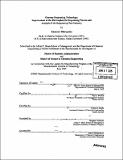Genome sequencing technology : improvement of the electrophoretic sequencing process and analysis of the sequencing tool industry
Author(s)
Maruyama, Kazunori, Ph. D. Mie University
DownloadFull printable version (4.718Mb)
Other Contributors
Leaders for Manufacturing Program.
Advisor
Roy E. Welsch and Patrick S. Doyle.
Terms of use
Metadata
Show full item recordAbstract
A primary bottleneck in DNA-sequencing operations is the capacity of the detection process. Although today's capillary electrophoresis DNA sequencers are faster, more sensitive, and more reliable than their precursors, high purchasing and running costs still make them a limiting factor in most laboratories like those of the Broad Institute. It is important to run those sequencers as efficiently as possible to reduce costs while producing robust assemblies. Polymer media for electrophoresis is the most important determinant for sequencing throughput. This thesis investigates the effect of polymer media on the performance of Applied Biosystems (ABI) 3730xl, the de-facto standard of DNA sequencers and develops analysis procedures for ABI3730xl system and its data. Due to its use in the human genome project (HGP), ABI has established a monopolistic position in the DNA-sequencing tool industry. As the de-facto standard of DNA sequencers ABI3730xl is highly automated, well-optimized, and black-boxed, despite the importance of higher throughput sequencing for diagnostic applications, third parties have found it difficult to improve sequencing methods. (cont.) This thesis also conducts an analysis of the DNA-sequencing tool industry to discuss how ABI has established current monopolistic status, what kind of business model would be attractive for ABI in the post-HGP period, how new companies can successfully enter this industry, and how they can keep improving DNA-sequencing throughput along the line of "Moore's law".
Description
Thesis (M.B.A.)--Massachusetts Institute of Technology, Sloan School of Management; and, (S.M.)--Massachusetts Institute of Technology, Dept. of Chemical Engineering; in conjunction with the Leaders for Manufacturing Program at MIT, 2005. Includes bibliographical references.
Date issued
2005Department
Leaders for Manufacturing Program at MIT; Massachusetts Institute of Technology. Department of Chemical Engineering; Sloan School of ManagementPublisher
Massachusetts Institute of Technology
Keywords
Chemical Engineering., Sloan School of Management., Leaders for Manufacturing Program.
